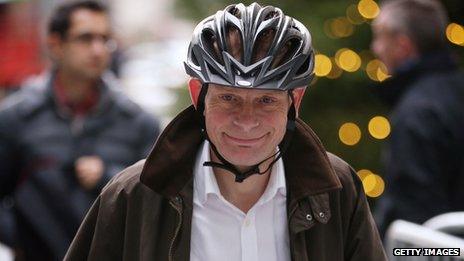Andrew Marr: Why do healthy people have strokes?
- Published

When you think of a "typical" stroke patient, the mind readily drifts towards someone who is elderly, possibly overweight, doesn't exercise and probably smokes.
Andrew Marr - a man in his 50s and an incredibly keen runner - doesn't seem to fit the bill.
Age is one of the biggest risk factors - but anyone of any age can have a stroke.
More than 150,000 people in the UK have a stroke each year and a quarter of them are under 65. There are even cases of childhood strokes, external.
A lot of the risky lifestyle choices, external that increase the chances of a stroke take time.
Smoking, carrying too much weight round the belly and being too fond of alcohol do not cause strokes overnight, rather they gradually increase your risk over a lifetime.
However, there are other causes of stroke in much younger and fitter people.
Defects from birth
A stroke starves the brain of oxygen when the blood supply is cut off - either by a clot (ischaemic stroke) or by blood vessels bursting inside the brain (haemorrhagic stroke).
About 80% of strokes are caused by blood clots, but it is not known which type of stroke Andrew Marr had on Tuesday.
However, when you look at just people under the age of 65, then haemorrhagic strokes become much more common - accounting for up to half of strokes.
Haemorrhagic strokes can be down to defects in blood vessels that have been present from birth. These time bombs in the brain can burst at any moment.
One example is an arteriovenous malformation, external, when arteries are plugged directly into veins, meaning the pressure inside is too much for the blood vessels to handle. They rupture leading to a bleed on the brain.
Sudden peaks in blood pressure, external are also a risk factor that can affect younger people, especially if they already have high blood pressure.
Even stress can raise blood pressure enough to cause a stroke and there is mixed evidence around the impact of drinking a lot of coffee.
An irregular heartbeat, known as atrial fibrillation, can also lead to ischaemic stroke. Part of the heart beats so fast that it stops working efficiently as a pump. Blood pools inside the heart, which can clot, travel to the brain and cause a stroke.
One factor nobody can avoid is their genes. Some people are just more likely to have a stroke than others and it can run in families.
Elderly misconception
Dr Clare Walton, from the Stroke Association, said: "I would say that it is a common misconception that this is a condition of just the elderly. A quarter of strokes are in working-age people and children and babies also have strokes.
"We should appreciate everyone is at risk of stroke and not just in old age."
Ultimately it all comes down to playing the odds. A healthy diet, regular exercise, drinking in moderation and not smoking dramatically reduces the chance of having a stroke.
Yet some people with the healthiest of lifestyles will still have a stroke, while some who do the exact opposite will not.
- Published9 January 2013